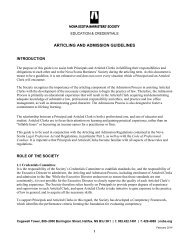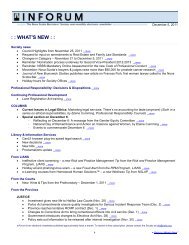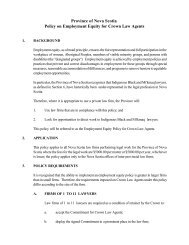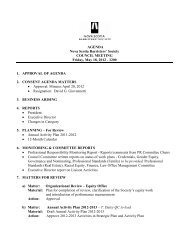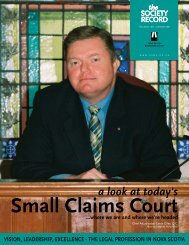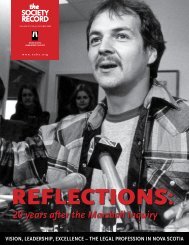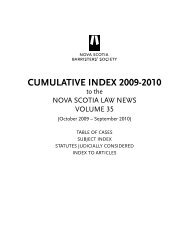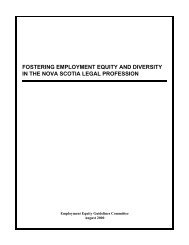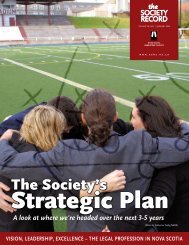the SOCIETY RECORD - Nova Scotia Barristers' Society
the SOCIETY RECORD - Nova Scotia Barristers' Society
the SOCIETY RECORD - Nova Scotia Barristers' Society
Create successful ePaper yourself
Turn your PDF publications into a flip-book with our unique Google optimized e-Paper software.
International legal regulation<br />
SUMMATION<br />
Photo provided by United Way Halifax<br />
Darrel I. Pink<br />
Executive Director<br />
The evolution of legal regulation<br />
over my 20-plus years at <strong>the</strong><br />
<strong>Society</strong> has been profound.<br />
In <strong>the</strong> 1990s, we were preoccupied by<br />
local issues. The <strong>Society</strong> undertook two reviews of its operations as it<br />
worked to ensure that it was as effective an organization as possible.<br />
In <strong>the</strong> aftermath of <strong>the</strong> Marshall Inquiry, our focus was on addressing<br />
diversity in <strong>the</strong> profession.<br />
The first decade of this century saw greater focus on national issues.<br />
The National Mobility Agreement gave rise to <strong>the</strong> need to address a<br />
variety of matters that affect all Canadian law societies and lawyers<br />
across <strong>the</strong> country. In <strong>the</strong> current decade, we now have a greater<br />
emphasis on international issues and how lawyers are regulated in<br />
o<strong>the</strong>r countries. We have come a long way.<br />
What has led to this is <strong>the</strong> recognition that <strong>the</strong> challenges facing<br />
clients, governments, <strong>the</strong> courts, and <strong>the</strong> profession are now global.<br />
Whe<strong>the</strong>r <strong>the</strong> focus is on working to improve access to justice, <strong>the</strong><br />
impact of technology, differing client expectations, or new legal<br />
services delivery models, we have realized that to regulate effectively<br />
we have to understand what is happening abroad.<br />
To that end a group of international legal regulators, from 19 countries<br />
representing about 30 regulators, held its inaugural conference in<br />
London last fall. Because so many of <strong>the</strong> changes we are seeing have<br />
happened in England, it was an ideal location to become immersed in<br />
<strong>the</strong> new forms of legal regulation <strong>the</strong>re and to compare <strong>the</strong>m to what<br />
is going on around <strong>the</strong> globe.<br />
In Canada, we have much to learn from <strong>the</strong> emergence of law<br />
practices that are not owned by lawyers. When government identified<br />
“consumer interest” as a paramount value in regulating legal service<br />
delivery, it forced regulators to devise models that would allow<br />
lawyers to practise in different structures ¾ in corporations owned<br />
by non-lawyers, in banks that deliver legal services along with a wide<br />
range of o<strong>the</strong>r products, and in law firms that are franchise operations<br />
delivering legal services in a form developed by o<strong>the</strong>rs. These are<br />
only a small slice of new structures that are now regulated in a new<br />
outcomes-focused regulation model that stresses <strong>the</strong> results of lawyer<br />
practice ra<strong>the</strong>r than specifying particular rules for what lawyers can<br />
and cannot do.<br />
International discussions allow o<strong>the</strong>rs to see <strong>the</strong> quality and integrity<br />
of Canada’s law societies as well. In particular our discipline work,<br />
which is likely <strong>the</strong> best in <strong>the</strong> world, in terms of both service to<br />
complainants and quality of disposition, are noted. Our colleagues<br />
want to better understand our processes so <strong>the</strong>y can emulate what is<br />
best among <strong>the</strong>m.<br />
Comparing what we do with American regulation raises difficult<br />
issues to be considered. While we fiercely defend ourselves in Canada<br />
from any form of government oversight, at <strong>the</strong> same time our U.S.<br />
counterparts proudly assert <strong>the</strong> value of <strong>the</strong>ir regulation by <strong>the</strong> judicial<br />
branch of government. As independent as judges are, <strong>the</strong> institutions<br />
of <strong>the</strong> judiciary are dependent upon legislators for funding. The<br />
indirect connection and impact this can have on lawyer regulation is<br />
not lost on most observers.<br />
Regardless of <strong>the</strong> model, international comparisons have allowed<br />
us to share and discuss core values such as integrity, lawyer-client<br />
privilege and independence ¾ one that is staunchly defended in every<br />
jurisdiction. We have looked at admission programs, legal education<br />
and continuing competence regimes. And we have only scratched <strong>the</strong><br />
surface. By learning from o<strong>the</strong>r ways of regulation, we are better able to<br />
understand and articulate <strong>the</strong> reasons for much of what we do. More<br />
importantly we are able to question long-held assumptions and <strong>the</strong><br />
biases that often come with doing things ‘as we have always done <strong>the</strong>m’.<br />
In <strong>Nova</strong> <strong>Scotia</strong>, <strong>the</strong> <strong>Society</strong> strives to be a regulator of world-class<br />
quality. The public and lawyers in <strong>Nova</strong> <strong>Scotia</strong> should expect nothing<br />
less. Achieving that goal becomes more likely when we invest <strong>the</strong> time<br />
to understand what is happening elsewhere, to learn from o<strong>the</strong>rs and<br />
to <strong>the</strong>n bring <strong>the</strong> best of what we see home with us.<br />
38<br />
The <strong>Society</strong> Record



